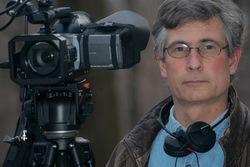
CCNY film Professor David Davidson whose latest documentary premieres on PBS, May 24
‘A Place Out of Time’ Tells of Last all-Black Public Boarding School in North
From 1866 to 1955, the Bordentown School in Bordentown, NJ, was an educational utopia for African-Americans, who were largely disenfranchised by the American education system. Known as “The Tuskegee of the North,” the school was an incubator of black pride and intellect where generations of children learned values, discipline and life skills.
More than half a century after its closing, David Davidson, Professor in the MCA Department and Director of the MFA in Media Arts Production, recounts the story of this unique institution in his latest documentary “A Place Out of Time – The Bordentown School.” Co-produced by Amber Edwards and narrated by Ruby Dee, it premieres nationally May 24 on PBS (9 p.m., Channel Thirteen in New York).
Two members of CCNY’s music department also worked on the project: Paul Kozel, Associate Professor and Director of the Sonic Arts Center supervised the audio production, and Ray Gallon, a lecturer, composed and performed some of the score.
The Bordentown School was the last all-black, publicly funded, co-educational boarding school north of the Mason-Dixon line. Professor Davidson, who has won two Emmy awards and several other honors, tells the story of the school’s birth, growth and decline through interviews with alumni, scholars and historians, and a treasure trove of archival footage and photographs.
The film is also a chronicle of black education in America across three centuries. It presents a rarely seen inside portrait of a separate black space and an historical preface to the growing national discussion about the role of historically black institutions in nurturing identity and personal accomplishment. The film also examines the ramifications of the school’s closing and the value of an education that includes manual training and daily physical labor in a community service context.
Students at Bordentown were trained in a variety of marketable trades, from agriculture to domestic science, and were schooled in academic and social skills, as well. With a 400-acre Georgian-style campus, Bordentown could easily be mistaken for an elite private school – yet, it was operated by the State of New Jersey.
In 1955, shortly after the Brown v. Board of Education Supreme Court decision made segregated education illegal, the state closed Bordentown. “It is astounding how, in a few short years, the image of Bordentown changed in the public consciousness,” Professor Davidson said. “In a very turbulent decade, it went from being perceived as an educational utopia to a Jim Crow school – a true irony, because it actually positioned students to be ready for the Civil Rights movement."
The increasing scrutiny and pressure on U.S. public education – especially in districts serving large minority populations – enhances the film’s relevance. “[The documentary] not only recounts the compelling story of this historic African-American institution, it also provokes us to broaden the discussion about the future of minority education in America,” said Hugh Price, former president and CEO of the National Urban League.
The Prudential Foundation, the Geraldine R. Dodge Foundation, the New Jersey Council on the Humanities and the New Jersey Historical Commission funded the film. For a complete listing of regional viewing times, visit www.bordentownschool.tv.